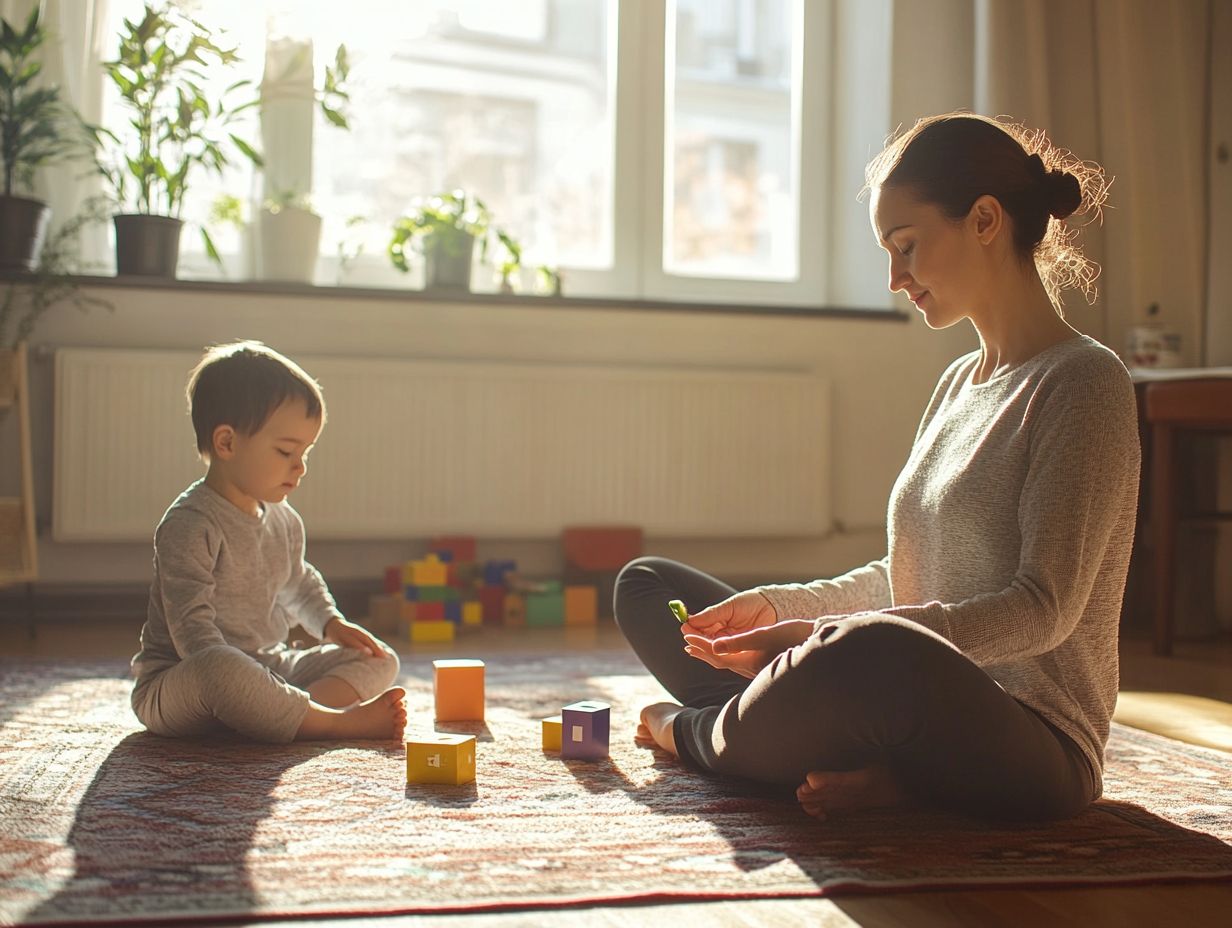How to Practice Mindfulness During Parenting
Parenting is a rewarding yet challenging journey, often fraught with stress, anxiety, and a whirlwind of emotions.
Embracing mindfulness and mindful parenting has the power to transform this experience, equipping you with the tools necessary to navigate the inevitable ups and downs with greater ease.
This article delves into the essence of mindfulness, outlining its core principles and highlighting the significant benefits it can bring to your parent-child relationships and overall family dynamics.
From reducing anxiety to enhancing communication and emotional regulation, you’ll uncover practical strategies to weave mindfulness into your daily routine, cultivating a calmer and more connected family environment.
Contents
- Key Takeaways:
- What is Mindfulness?
- How Can Mindfulness Benefit Parents?
- How to Incorporate Mindfulness into Parenting?
- What Are Some Tips for Practicing Mindfulness During Parenting?
- How Can Parents Involve Children in Mindfulness Practices?
- Frequently Asked Questions
- What is mindfulness and how does it relate to parenting?
- How can I practice mindfulness during everyday tasks as a parent?
- How can mindfulness help me remain calm and patient with my children?
- What are some mindfulness techniques I can use when dealing with challenging parenting situations?
- How can I involve my children in practicing mindfulness?
- How can I stay consistent with my mindfulness practice while balancing the demands of parenting?
Key Takeaways:

- Practicing mindfulness can help reduce stress, improve parent-child communication, and increase self-awareness.
- Mindful activities and language are essential for incorporating mindfulness into parenting.
- Setting realistic expectations and taking breaks are vital for effective mindfulness practice.
What is Mindfulness?
Mindfulness, at its essence, is the art of being fully present and aware in each moment. It enables you to cultivate emotional awareness and enhance your overall mental well-being. This practice invites you to actively engage and experience the transformative power of being present in every moment, providing significant benefits for parents seeking a harmonious relationship with their children and aiding in stress reduction.
By weaving mindful techniques into your daily routines, you can promote positive behaviors and improve your emotional regulation, paving the way for supportive interactions that help your child grow.
Key Principles of Mindfulness
The principles of mindfulness center around vital concepts such as being present and aware, cultivating self-compassion, and fostering emotional regulation each essential for effective mindful parenting and positive parenting outcomes.
By embracing non-judgment and acceptance, you can create an environment in which your children feel safe to express their emotions and thoughts, free from the fear of criticism. This approach encourages open communication and mindful communication, allowing you to gain a deeper understanding of your child’s perspective.
Being fully present enables you to connect with your children on a profound level, transforming everyday interactions into meaningful exchanges. By incorporating these foundational principles, you can enhance your decision-making and foster a nurturing atmosphere that not only supports your child’s development but also strengthens the bond you share.
How Can Mindfulness Benefit Parents?
Mindfulness presents a wealth of advantages for you as a parent. It can significantly reduce stress, enhance your emotional regulation, and improve the quality of communication between you and your child. These mindfulness practices also provide mental health benefits and support overall well-being.
Ultimately, embracing mindfulness fosters a nurturing parenting environment that supports your children’s development and addresses their emotional needs. Mindful parenting techniques can lead to better behavior and help children become more emotionally resilient.
1. Reduces Stress and Anxiety
By embracing mindfulness, you can significantly lower your stress and anxiety levels. These are common hurdles in the parenting journey. This approach not only benefits your mental health but also positively impacts your children, aiding in their overall development and reducing childhood anxiety.
Incorporating specific mindfulness practices, such as mindful meditation and focused breathing exercises, can enhance this transformative experience. Even dedicating just a few minutes each day to mindful meditation can help you center your thoughts, fostering a sense of calm and clarity that resonates throughout your family interactions. These practices also support emotional regulation and create mindful moments in your daily life.
Using simple breathing techniques like the 4-7-8 method can ease feelings of tension quickly, enabling you to respond to your children with increased patience and empathy. By reducing stress within your home, you cultivate a nurturing environment that encourages emotional regulation and resilience in your children, ultimately promoting their overall development and well-being. These mindful practices can improve family dynamics and foster close relationships.
2. Improves Parent-Child Communication
Mindfulness significantly enhances your communication with your child by fostering mindful listening and ensuring you are fully present and genuinely engaged with their emotional needs. This level of engagement helps you be more aware and engaged with your child s feelings, aiding in attentive listening and supporting better understanding of emotions.
Imagine your child expresses frustration about schoolwork. Instead of jumping in with solutions, take a moment to pause and listen actively. This means nodding, maintaining eye contact, and reflecting back what your child shares to demonstrate your understanding. This creates a safe space where your child feels heard and understood, which is essential for nurturing healthy relationships.
Moreover, validating their emotions grants your child the permission to express themselves freely, which reinforces their confidence. Simple phrases like, “I understand that you’re upset,” not only promote emotional validation but also deepen the trust within your relationship. These mindful responses can greatly enhance your supportive parenting approach.
3. Enhances Emotional Regulation
Practicing mindfulness enables you to enhance your emotional regulation, allowing you to respond calmly and thoughtfully to the challenges of parenting. This, in turn, positively impacts your overall parenting outcomes and supports mindful discipline and conflict resolution within your family.
By incorporating mindfulness techniques like deep breathing exercises, guided meditations, and moment-to-moment awareness, you can cultivate a state of emotional balance that benefits both you and your children. These practices increase your awareness of your own emotional responses, allowing you to recognize triggers before they escalate into heated interactions. Additionally, exploring yoga techniques for mindful parenting can improve your parenting techniques and support your mental health.
Regular mindfulness activities foster a sense of patience and presence, giving you the ability to pause and reflect rather than react impulsively. These activities support nurturing behaviors and mindful awareness in your parenting practices.
As a result, you become skilled at navigating conflicts with a clearer mindset, ultimately leading to stronger family bonds and a more harmonious home environment. This mindful approach aids in conflict resolution and strengthens relationships.
4. Increases Self-Awareness

Mindfulness practices cultivate a deeper self-awareness in you as a parent. This awareness allows you to recognize your own emotional needs and mindful behaviors in relation to your parenting style. It supports positive parenting strategies and mindful interactions.
This enhanced awareness can profoundly impact how you interact with your children. It enables you to respond with greater thoughtfulness and empathy.
By understanding your emotional triggers and reactions, you can adjust your approaches to better address the emotional needs of your children. Self-aware parents like you are more likely to foster a nurturing environment that supports healthy emotional development.
These mindful practices can improve your ability to provide compassionate and empathetic support to your children.
Try incorporating mindfulness exercises like deep-breathing techniques and reflective journaling to boost your self-awareness, creating a stronger bond with your children. Through these practices, you engage with your children not merely as a reaction to situations but from a place of calm and understanding.
These practices are essential for managing parenting challenges and fostering supportive parenting.
How to Incorporate Mindfulness into Parenting?
Incorporating mindfulness into your parenting journey is entirely achievable through straightforward yet impactful techniques. By embracing mindful activities and employing parenting strategies that foster present and attentive interactions with your children, you can create a nurturing environment that enhances both your well-being and theirs.
Mindful parenting and attention to child needs are key components of these strategies.
1. Practice Mindful Breathing
Mindful breathing is an essential practice that enables you to cultivate emotional awareness and reduce stress. It helps create a calm presence during your parenting interactions and supports self-regulation.
By directing your focus to your breath, you can carve out a moment of stillness amid the daily chaos of family life. To get started, find a quiet spot where you can sit comfortably. Gently close your eyes and take a deep breath in through your nose, feeling your lungs expand fully. Then slowly exhale through your mouth. Repeat this process for several minutes, allowing each breath to ground your thoughts and release any tension you re holding.
This practice aids in emotional regulation and stress reduction. For your children, guiding them through similar breathing exercises can significantly promote self-regulation and emotional control.
By integrating mindful breathing into your family routines, you not only enhance emotional resilience but also encourage better communication and strengthen relationships.
This thoughtful approach paves the way for a more harmonious household, where everyone can thrive. Mindful parenting techniques such as this foster positive behavior and nurturing behaviors in children.
2. Be Present in the Moment
Being present in the moment is essential for crafting mindful experiences. It enhances your interactions with children and promotes attentive listening to their needs.
This approach supports compassionate and empathetic interactions, which are essential for understanding emotions. To nurture a deeper connection, you can adopt simple yet effective strategies that weave mindfulness into your daily routines.
Consider setting aside specific times free from digital distractions to devote your full attention to your little ones. These mindful moments are crucial for building close relationships and enhancing family dynamics.
Activities like cooking together or reading a story can transform into meaningful bonding opportunities. Incorporating mindful breathing exercises during transitions or at the start of the day can help both you and your children ground yourselves and focus on the present.
These activities foster mindful interactions and supportive parenting. By embracing these mindful practices, you cultivate an environment rich in mindful awareness and presence for your family, fostering positive parenting and close relationships.
3. Use Mindful Language
Using mindful language means embracing compassionate communication techniques that enhance positive interactions. These techniques support children’s emotional development by addressing their emotional needs and fostering conflict resolution.
By thoughtfully selecting your words, you can significantly strengthen your connection with your child. Transform conversations into more meaningful exchanges. For instance, rather than saying, “Don’t be upset,” which may unintentionally dismiss their feelings, consider a more mindful response like, “I see you’re feeling sad; do you want to talk about it?” This approach not only validates their emotions but also fosters a sense of openness.
Such phrases not only promote understanding but also impart the vital lesson of expressing feelings. This process nurtures emotional intelligence along the way. When compassionate communication becomes your standard, the parent-child relationship flourishes, cultivating a home environment rich in respect and empathy.
4. Engage in Mindful Activities with Children
Engaging in mindful activities with your children not only enhances their development but also strengthens family dynamics. It fosters supportive parenting relationships, encouraging thoughtful actions and caring actions.
These shared experiences are a fantastic way to connect! They offer a unique opportunity for you and your children to bond on a deeper level, cultivating emotional awareness and communication skills. For instance, mindful art sessions can unleash creativity while helping your kids express their feelings, making it easier for them to articulate their emotions.
Taking nature walks encourages exploration and appreciation of the environment, providing a perfect setting for discussing feelings surrounding the beauty of nature and its calming effects. Practicing yoga together not only promotes physical health but also teaches mindfulness and breathing techniques, equipping your children with tools to manage stress and anxiety.
Collectively, these activities contribute to positive behavior and create a nurturing home atmosphere.
What Are Some Tips for Practicing Mindfulness During Parenting?
Practicing mindfulness during parenting can lead to mental health benefits for both parents and children. It fosters compassion and understanding while improving overall family dynamics.
Practicing mindfulness in your parenting journey can be significantly enriched by embracing specific strategies. These strategies foster self-compassion, patience, and effective parenting insights, promoting better parenting outcomes and positive behavior in children.
1. Set Realistic Expectations

Setting realistic expectations is vital for you in managing the challenges of parenting while also supporting effective self-regulation. This approach allows you to address your emotional needs alongside those of your children.
When you establish achievable goals for both yourself and your kids, you significantly reduce the pressure that often comes with the parenting role. Recognizing this is crucial for your parenting journey! It’s essential to understand that every child is unique; what works wonders for one may not resonate with another. By prioritizing adaptability and understanding the dynamics of your family, you can navigate challenges more smoothly.
Incorporating strategies such as open communication, setting incremental goals, and practicing self-compassion can transform your parenting journey into a more enjoyable experience. This not only enhances your relationship with your children but also fosters an environment where everyone parents and kids alike feels supported and understood.
Ultimately, this leads to a healthier family dynamic that everyone can thrive in.
2. Be Patient with Yourself and Your Children
Practicing patience with yourself and your children is essential for fostering a supportive parenting environment and developing self-compassion, which in turn nurtures your understanding of emotions.
This caring atmosphere paves the way for improved emotional regulation, enabling both you and your children to navigate life’s challenges with grace. By exemplifying patience, you model invaluable coping strategies, showing how to manage stress and disappointment effectively.
To cultivate this vital quality, begin by weaving mindfulness techniques into your daily routines; consider deep-breathing exercises or taking a moment for reflection before responding to those overwhelming situations. This can promote calm responses and enhance your parent-child relationship. For a more in-depth understanding, explore mindfulness in parenting.
Setting realistic expectations and recognizing the natural ebb and flow of parenting can significantly diminish frustrations, ultimately creating a more harmonious family dynamic where everyone feels valued and understood.
3. Take Breaks When Needed
Taking breaks when needed is an essential self-care practice that allows you to recharge and maintain mindfulness, ultimately leading to stress reduction and better management of parenting responsibilities.
In the whirlwind of parenting responsibilities, it s all too easy to overlook the importance of carving out personal time. Those precious moments away from daily demands not only cultivate a sense of calm but also enable you to reconnect with your own needs, enhancing your overall emotional health.
Consider implementing strategies like scheduling short, regular intervals for relaxation or engaging in activities that spark joy whether that s dive into a good book, meditating, or simply soaking in the beauty of nature. These mindful breaks can make a significant difference. They encourage reflection and renewal, equipping you with the resilience needed to nurture your children while maintaining balance in your life.
How Can Parents Involve Children in Mindfulness Practices?
You can effectively engage children in mindfulness practices by teaching them straightforward techniques and fostering open communication about their thoughts and emotions. This approach creates a shared mindfulness experience that strengthens your connection and enhances their understanding of self-awareness.
1. Teach Children Mindful Breathing Techniques
Teaching children mindful breathing techniques equips them with essential mindfulness skills that enhance emotional regulation and provide effective tools for managing stress.
These exercises can become a foundational practice for young ones, helping them develop healthier coping mechanisms to navigate everyday challenges. By guiding them through simple, step-by-step mindful breathing activities, you can cultivate a sense of calm and awareness in their lives.
Creating an inviting environment is crucial, as it allows children to feel comfortable expressing their feelings this openness lays the groundwork for successful practice. You might also consider utilizing creative techniques, such as storytelling or incorporating engaging visuals, to make the experience both fun and relatable. This approach aids in the child’s ability to connect with their breath and emotions.
Over time, these skills can significantly bolster their resilience and emotional well-being, setting them on a path toward lasting mindfulness.
2. Practice Mindful Activities Together
Practicing mindful activities together allows you and your family to strengthen your bonds while addressing childhood anxiety and fulfilling emotional needs through shared experiences.
Engaging in activities such as yoga, meditation, or nature walks provides you with invaluable opportunities to communicate openly and support one another. For instance, mindful breathing exercises equip your children with essential tools to manage anxiety, while discussions during a hike foster emotional awareness and create a safe space for feelings to be expressed.
Creative activities like journaling or art projects encourage your children to articulate their emotions effectively, which can significantly enhance your family dynamics. By incorporating these practices into your daily routines, you will not only nurture emotional connections but also build resilience, ultimately leading to a more harmonious home environment where everyone feels understood and valued.
3. Encourage Open Communication About Thoughts and Emotions
Encouraging open communication about thoughts and emotions cultivates compassion and empathy within your family, creating a safe haven for your children to express themselves freely while enhancing the overall parent-child relationship and fostering mindful communication.
To achieve this, consider implementing regular discussions that allow every family member to share their experiences and feelings without fear of judgment. Simple routines, such as engaging in family dinner conversations or setting aside time for weekly emotional check-ins, can become invaluable platforms for connection.
During these discussions, it s essential for you to actively listen to your children, validate their feelings, and encourage them to articulate their thoughts openly. By establishing an environment where questions are welcomed and opinions are respected, you help your children develop the confidence to share their emotions.
When your children perceive your home as a nurturing space, it not only enhances their emotional well-being but also deepens the bonds that tie your family together.
Video by Vera Livchak on mindful meditation and its mental health benefits.
Frequently Asked Questions
Here are some frequently asked questions on mindfulness, its mental health benefits, and its role in parenting.
What is mindfulness and how does it relate to parenting?
Mindfulness is the practice of being present and aware in the moment. In parenting, it helps in managing parenting challenges, promoting mindful techniques and mindful moments.
Mindfulness is the practice of being fully present in the moment, without judgment. It can greatly benefit parenting by helping parents be more attentive and responsive to their children’s needs, thus enhancing the parent-child relationship and addressing children’s emotional needs. For more insights, explore the role of mindfulness in parenting challenges.
How can I practice mindfulness during everyday tasks as a parent?
One way to practice mindfulness during parenting is to focus on your breath while doing tasks like cooking, cleaning, or playing with your child. Take a few deep breaths and pay attention to the sensations in your body to stay present and aware in the moment. This helps in developing mindfulness skills necessary for attentive listening and mindful responses to your child’s needs.
How can mindfulness help me remain calm and patient with my children?
Mindfulness can help you become more aware of your thoughts and emotions, allowing you to respond more calmly and patiently to your children’s behaviors. By staying present and taking a moment to pause and reflect before reacting, you can choose a more positive response. Such mindful behaviors contribute to positive parenting and effective conflict resolution, ultimately supporting your child’s development and reducing stress.
What are some mindfulness techniques I can use when dealing with challenging parenting situations?
Breathing exercises, body scans, and mindful movement are all helpful techniques to use when facing challenging parenting situations. These mindful techniques can help you stay grounded and maintain a sense of calm while handling difficult situations, fostering emotional regulation and self-regulation in both you and your child.
How can I involve my children in practicing mindfulness?
You can involve your children in mindfulness practices by incorporating them into daily activities like taking a nature walk, doing a guided meditation together, or practicing gratitude by sharing something you are thankful for each day. These mindful interactions promote understanding emotions, compassion and empathy, and can mitigate childhood anxiety.
How can I stay consistent with my mindfulness practice while balancing the demands of parenting?
It’s important to remember that mindfulness is a practice, not a destination. Be patient with yourself and make it a priority to carve out small mindful moments throughout the day for mindfulness. This could be as simple as taking a few deep breaths while waiting in the carpool line or practicing a brief body scan before bed. Regular mindfulness practice can improve mental health benefits such as reducing parental stress and enhancing overall family dynamics.







